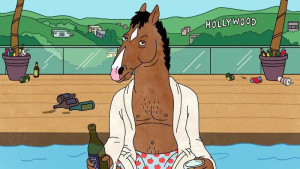
Some television shows make you laugh. Some television shows make you cry.
BoJack Horseman is nearly uncontested in its uncanny ability to render you completely numb and emotionally exhausted by the time the end credits start rolling.
The latest season is no different than the others in that way and has considerably found its niche as one of the oddest, most self-aware and genuine shows I have ever seen.
The newly released fifth season on Netflix takes a different approach to telling the interwoven stories of the main cast of characters by focusing on one character’s story arc in each episode instead of solely focusing on the turbulent trajectory of eponymous main character BoJack, giving the writers more opportunities to finally expand on characters’ backstories and creating more nuance for motivations.
The visual gags and references that BoJack is known for are still plentiful this season, and they give the show much-needed levity during the heaviest times. Personal favorites include Mane ‘n Tail shampoo in BoJack’s shower and the feline Princess Carolyn’s bookshelf that includes Purrsepolis, The Color Purrple, and Romeow and Juliet.
The real highlight of the show is how well the writers and actors have collaborated to make a thoughtful and acutely incisive depiction of the painful disappointment of day-to-day life. We aren’t watching a silly animated comedy show about an anthropomorphized version of Hollywood (referred to as “Hollywoo” since the first season when the D was stolen off of the Hollywood sign). We’re viewing a moving portrait of human nature, mental illness, and ordinary issues that come with the weight of existence.
When I saw that the fifth season had been released, I am not joking when I say that I watched this entire season in a night. Twelve half-hour episodes later, I felt a strange emptiness after having learned unhappy and miserable truths of the characters, including drug addiction, identity crises, death and trauma. I felt as numb as I did with every season ending, like I had just endured a particularly rough therapy session.
All of the pain in daily life is articulately expressed in these storylines, from heartbreak to loneliness and being invested leads to greater payoff and greater despair when you realize that this is not your average show about an alcoholic and drug-addicted horse; it’s a reflection of life. This is a show that won’t end with a happy, satisfying resolution.
One thing BoJack Horseman excels in is its innovative ways of storytelling. The third season had an almost entirely silent episode that took place underwater when BoJack attended an underwater film festival. I haven’t enjoyed (or watched, for that matter) a silent episode like this since Buffy the Vampire Slayer’s episode “Hush.” This season presents another explorative format, where BoJack soliloquizes about his mother and how her parenting skills — or lack thereof — formed him into the horse he is today.
The entire episode is one long scene of BoJack presenting an impromptu eulogy about his mother. Actor Will Arnett flexes his voice acting skills and shows why his voice is such a powerful instrument by giving BoJack the depth, cynicism, and deep unhappiness he has with the world. It is a powerful performance and one of the best episodes in the season.
One critique I do have is around the character of Diane Nguyen. In the beginning of the season, she experiences a crisis in an episode centered around her after divorcing her husband, a golden retriever named Mr. Peanutbutter. She escapes the pain of separation by traveling to Vietnam, where her family comes from (although her family identifies more with Boston accents and the hyper-patriotic American culture of sports than Vietnamese heritage). The episode partly focuses on a fascinating exploration of her identity and how she feels about being Vietnamese-American, since it is rarely spoken about before this episode.
The downside of an otherwise important plot direction is that the character of Diane is voiced by Alison Brie, a white actor. This whitewashing is unfortunately still common.
With that being said, the impact of this storyline feels very hollow and severely takes away from the discourse and dilemmas that could have been presented. In a recent Slate interview, creator Raphael Bob-Waksberg has since stated regret at his choice of erasing Diane’s Vietnamese-American identity because a white actor was hired, and recognizes that there needs to be more action instead of an underwhelming public statement.
I’m trying to grapple with the fact that within this same season, characters on the show joked about Scarlett Johansson’s publicist’s obvious errors with having her cast in the whitewashed movie Ghost in the Shell, but hypocritically, Alison Brie is still voicing a non-white character on the show. Improvement has yet to be seen, and I’m hoping that this will be addressed more in future seasons. For now, this is still a show that has a lot to fix and critically analyze.
However, what I enjoy so much about BoJack Horseman is how unflinching it is with its message and delivery to its rapturous fan base — no matter how much you like these characters, their lives are not going to be any easier. BoJack himself says it best when he relates life to a television show and how a show can only exist if the characters are unhappy and experiencing conflict. If they’re content, then the show ends. With how many struggles these characters go through, I don’t know if this series can ever end. I’m not entirely sure if that’s a good thing for the viewers or for their therapists, but it is undeniably entertaining to watch while you’re curled up in the fetal position, questioning what happiness means for you and for BoJack.
